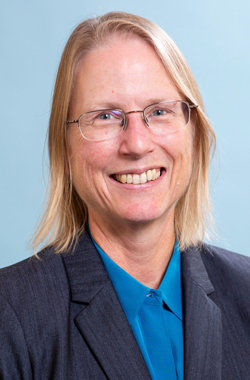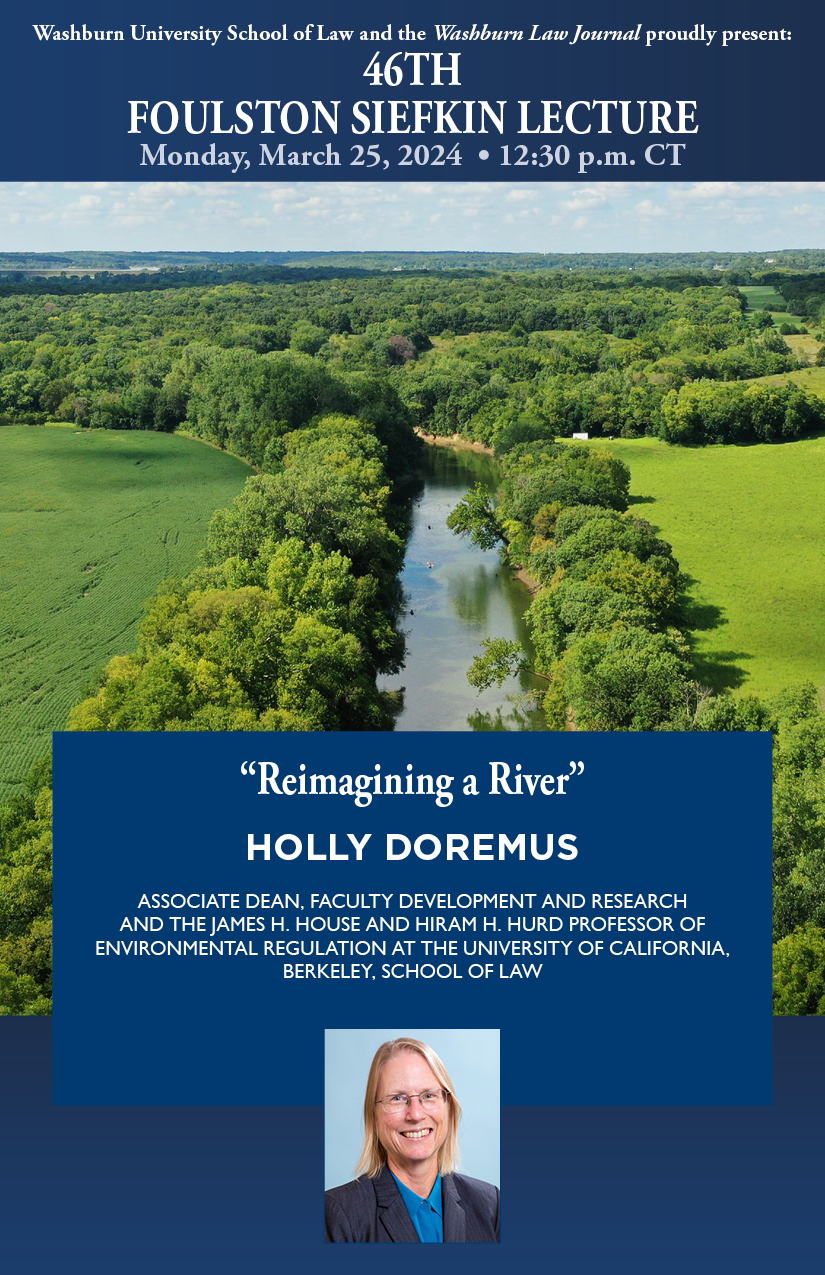
Foulston Siefkin Lecture, 2024: Holly Doremus
Washburn University School of Law
and the Washburn Law Journal
proudly present the
46th Foulston Siefkin Lecture
Holly Doremus
Associate Dean, Faculty Development and Research and the James H. House and Hiram H. Hurd Professor of Environmental Regulation at the University of California, Berkeley, School of Law
"Reimagining a River"
Monday, March 25, 2024 • 12:30 p.m. • Room 152 & Zoom

Associate Dean Holly Doremus brings a strong background in life sciences and a commitment to interdisciplinary teaching and scholarship to her work at Berkeley Law. She earned her PhD in Plant Physiology from Cornell University and was a post-doctoral associate at the University of Missouri before making the transition to law. In addition to her law school teaching experience, she has taught in the graduate ecology program at UC Davis, in the College of Natural Resources at UC Berkeley, and at the Bren School of Environmental Science and Management at UC Santa Barbara. She has been a principal investigator on several interdisciplinary grants; has co-authored papers with economists, sociologists, ecologists, conservation biologists and others; and has been a member of three National Research Council review committees.
Doremus received her JD and Environmental Law Certificate from Berkeley Law, where she was an articles editor for the Ecology Law Quarterly and a member of the Order of the Coif honor society. She then clerked for Judge Diarmuid F. O’Scannlain of the U.S. Court of Appeals for the Ninth Circuit, practiced municipal and land use law with the firm of Eickelberg & Fewel in Corvallis, Ore., and taught at the University of Oregon and Oregon State University before beginning her law teaching career at UC Davis in 1995. She is an elected member of the American Law Institute and a Fellow of the American Association for the Advancement of Science. She has served on the Board of Directors of Defenders of Wildlife and of Audubon California. She was honored as a UC Davis Chancellor’s Fellow for 2001-2006.
Abstract
Four dams on the Klamath River are coming down, in what reportedly is the largest dam removal operation to date in the world. The dam removal project marks an inflection point after decades of conflict over management of the Klamath. It marks the end of one set of arguments, although others continue. It’s a milestone for engineers and ecologists. It’s a time of excitement moment for advocates of freeing this river, and rivers in general, from intensive human control, and a time of concern for those who have built their social and economic expectations on the modified river. In this paper, I argue that dam removal should be seen not just as a state change for this river, but as an opportunity to reconsider our societal view of the meaning of this river, and of rivers more generally. We have long seen rivers as objects to be managed: threats to be controlled, servants to be mastered. More recently, we have seen them as a different kind of object: the foundations of ecological communities, requiring protection or restoration. But rivers are far more than their direct economic and ecosystem functions. They are not just shaped by human preferences; they shape their associated human and ecological communities. Rivers are connectors and dividers. They connect peoples through trade, and divide them as boundaries. They connect and divide ecosystems, moving soil, nutrients and some organisms, while blocking the movement of others. They can connect people to or sever them from nature. Rivers are also powerful symbols, creating and expressing human identities. Communities are of the rivers that dominate their landscapes, and they are of the worlds those rivers make possible. The legal and institutional structures through which rivers are managed should explicitly recognize the constitutive nature of rivers, expressing our aspirations for the future as well as our connections to the past. I consider what a reimagined Klamath River and its communities might look like in the near and long term, and how governance might be structured to facilitate that reimagination.

has sponsored this lecture series since 1978 to enrich the
quality of education at Washburn University School of Law.
Articles derived from the lectures are published by
the Washburn Law Journal.
